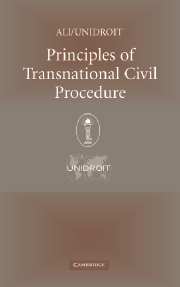Book contents
- Frontmatter
- Contents
- Foreword
- Reporters' Preface
- Preface, by E. Bruce Leonard
- Preface, by Jorge A. Sánchez-Cordero Dávila
- A Drafter's Reflections on the Principles of Transnational Civil Procedure, by Geoffrey C. Hazard, Jr.
- Introduction
- PRINCIPLES OF TRANSNATIONAL CIVIL PROCEDURE (with commentary)
- PRINCIPLES OF TRANSNATIONAL CIVIL PROCEDURE (with commentary), French Version
- APPENDIX: REPORTERS' STUDY
- RULES OF TRANSNATIONAL CIVIL PROCEDURE (with commentary)
- A Bibliography of Writings about the ALI/UNIDROIT Project
- Index
Foreword
Published online by Cambridge University Press: 06 January 2010
- Frontmatter
- Contents
- Foreword
- Reporters' Preface
- Preface, by E. Bruce Leonard
- Preface, by Jorge A. Sánchez-Cordero Dávila
- A Drafter's Reflections on the Principles of Transnational Civil Procedure, by Geoffrey C. Hazard, Jr.
- Introduction
- PRINCIPLES OF TRANSNATIONAL CIVIL PROCEDURE (with commentary)
- PRINCIPLES OF TRANSNATIONAL CIVIL PROCEDURE (with commentary), French Version
- APPENDIX: REPORTERS' STUDY
- RULES OF TRANSNATIONAL CIVIL PROCEDURE (with commentary)
- A Bibliography of Writings about the ALI/UNIDROIT Project
- Index
Summary
The proposals for law reform published in this volume result from a happy collaboration between the International Institute for the Unification of Private Law (UNIDROIT) and The American Law Institute (ALI).
UNIDROIT, based in Rome (Italy), was founded in 1926 as a specialized agency of the League of Nations. After World War II it continued as an independent intergovernmental organization on the basis of a multilateral agreement, the UNIDROIT Statute. Its purpose is to study needs and methods for modernizing, harmonizing, and coordinating private law between states and groups of states and to prepare legislative texts for consideration by governments. Membership is restricted to states. The currently 59 member states are drawn from the five continents and represent all varieties of different legal, economic, and political systems as well as different cultural backgrounds. The organization has over the years prepared over 70 studies and drafts. In recent years, nine Conventions plus various “soft-law“ instruments such as Model Laws, Guides, and the UNIDROIT Principles of International Commercial Contracts (1994 and 2004), www.unidroit.org/english/principles/contracts/main.htm, were adopted. At present, the focus is on secured-transactions law (Convention on International Interests in Mobile Equipment (Cape Town, 2001), www.unidroit.org/english/conventions/mobile-equipment/main.htm), and capital-market law. It is envisaged to further develop the Principles of International Commercial Contracts.
- Type
- Chapter
- Information
- Principles of Transnational Civil Procedure , pp. xxiii - xxviPublisher: Cambridge University PressPrint publication year: 2005



